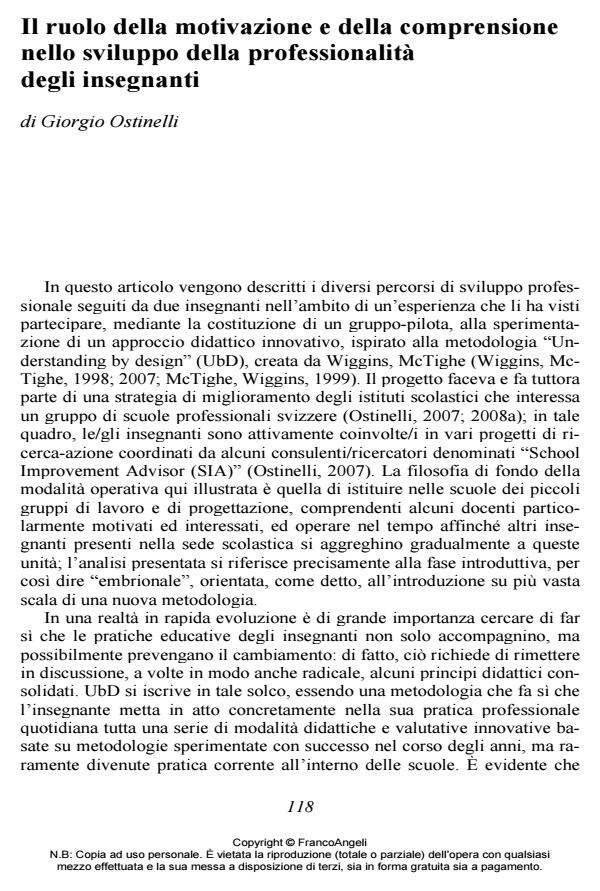Il ruolo della motivazione e della comprensione nello sviluppo della professionalità degli insegnanti
Journal title EDUCATIONAL REFLECTIVE PRACTICES
Author/s Giorgio Ostinelli
Publishing Year 2012 Issue 2012/1
Language Italian Pages 22 P. 118-139 File size 421 KB
DOI 10.3280/ERP2012-001008
DOI is like a bar code for intellectual property: to have more infomation
click here
Below, you can see the article first page
If you want to buy this article in PDF format, you can do it, following the instructions to buy download credits

FrancoAngeli is member of Publishers International Linking Association, Inc (PILA), a not-for-profit association which run the CrossRef service enabling links to and from online scholarly content.
This paper depicts the different paths followed by two teachers in the development of their professionalism, through their participation to a pilot group experimenting a fairly innovative teaching approach, inspired to Wiggins & McTighe’s "Understanding by design (UbD)" methodology (Wiggins & McTighe, 1998; McTighe & Wiggins, 1999; Wiggins & McTighe, 2007). UbD is a constructivist way to organize teaching, involving significant changes to usual teaching practices. The project is part of a wider school improvement strategy actually taking place in a group of Swiss vocational schools (Ostinelli, 2007, 2008a), whereby teachers are supported by some School Improvement Advisor/researchers (SIA). The SIA can be roughly described as a figure being at the same time an advisor, a researcher and a critical friend. The key idea is, after the creation of some pilot groups, to "aggregate" other teachers and to disseminate the experience to other schools: the present article deals with the first, embryonic stage. In today's world, is quite important for teachers not only to accompany, but also to be able to prevent the change taking place inside schools; in this context, an evolution in their teaching practices is decisive. UbD can be a good path to follow in this journey, but, like various innovations, can be also difficult, either for the teacher and the SIA. This article will try to explain why one of the teachers assimilated the new methodology, improving his professionalism, while the other didn’t. Why and how, in some circumstances, a lack of understanding of the situa- tion experienced can drive to negative consequences to the development of innovative teaching skills? Which is the role of motivation in this context? In order to try to give some answers to these questions, both teachers were firstly interviewed, and then a motivational test was administered to them. The collected informations proved useful for a better understanding of the dynamics underlying the described experience.
- Between university and school: the School Improvement Advisor/researcher (SIA) Giorgio Ostinelli, in International Journal of Leadership in Education /2019 pp.189
DOI: 10.1080/13603124.2017.1321784
Giorgio Ostinelli, Il ruolo della motivazione e della comprensione nello sviluppo della professionalità degli insegnanti in "EDUCATIONAL REFLECTIVE PRACTICES" 1/2012, pp 118-139, DOI: 10.3280/ERP2012-001008